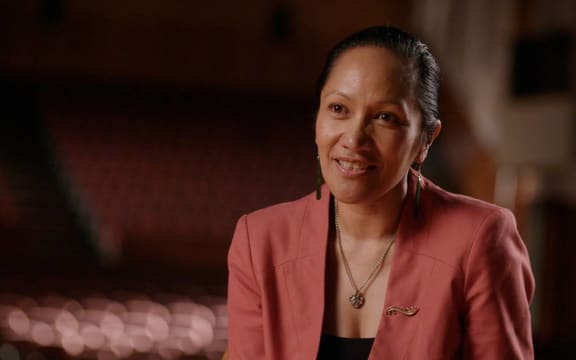
Photo: RNZ / Marika Khabazi
At least four people have died while waiting for a watchdog to investigate whether they've been the subject of a potential miscarriage of justice.
The Criminal Cases Review Commission / Te Kāhui was set up in 2020 and has so far referred two cases to an appellate court, with a third expected to be announced soon.

Parekawhia McLean Photo: Whakaata Māori
The agency received 421 applications between its inception and the end of last year. Of those, 159 had been reviewed and completed, 30 were under investigation, and 216 were in the initial assessment phase. About two dozen applications made in the commission's first six months were among those still in the initial assessment phase.
Now RNZ can reveal some applicants have died before finding out whether the watchdog was willing to take up their cases.
Chief executive Parekawhia McLean said the agency could not comment on specific cases, but confirmed she was aware of four such situations. The commissioners had made the call to see the investigations through to completion, she said.
"It's really important to close out the review process from our perspective. We could have just said, 'Okay, well that's it', but we think in terms of the interests of justice and the whānau too, we do complete that work."
One case had been in the section 25, or in-depth, investigation stage when the applicant died.
"We had completed the investigation to the point of being satisfied there was no miscarriage of justice at the time they passed. This case has been closed," McLean said.
Of the other three, one was still being triaged and the other two were in the initial assessment phase.
"In two of these cases, the information provided did not satisfy Te Kāhui there had likely been a miscarriage of justice, and a report has been completed recommending no further action. In the final case, we are still reviewing some case information."
The commission only became aware of deaths when a family member or advocate for the applicant contacted it, McLean said.
Government agencies oppose releasing information
RNZ can also reveal the commission has faced opposition while trying to obtain information from other government departments.
Under the Criminal Cases Review Commission Act 2019, the agency has special powers allowing it to require organisations to hand over information relevant to its investigations. It can only use this power after it has taken reasonable steps to try and obtain the information by consent first.
The commission was forced to use its 'powers of compulsion' 40 times during the last financial year.
"It has been frustrating ... we endeavour to work co-operatively with our, and we do consider them to be, partners. They all have a vested interest in this, and there have been times when we've thought we would get the information without it being redacted, for example, and then of course that's not been the case," McLean said.
While some organisations did not believe they were required to release information to the commission, this was rare. Rather, McLean believed institutions were usually trying to protect themselves.
"It tends to be the same organisations, entities that we're dealing with, and these are entities that we are dealing with almost on a day-to-day basis on specific cases," she said.
"It is often to ensure there is a good record of information passing between organisations legally ... it is fundamentally about protecting all parties in law in relation to information, that is often sensitive, being released to another party."
First inquiry into systemic issues expected
The watchdog was also likely to launch its first inquiry into systemic issues relating to miscarriages of justice within the next six months.
"The commissioners have had extensive discussion on a theme already, we have a terms of reference that has been prepared, and we are hoping also to present that to the Minister of Justice (because that is the first person who receives it before we go public) and we're hoping to do that within the next two to three months," McLean said.
"We've identified some experts already both internationally and nationally that we will draw on."
McLean could not reveal the focus of the inquiry but said the commission's second and third referrals would both relate to the theme.
The agency referred its second case to the Court of Appeal last month, after finding problems with the investigation and trial of Mikaere Oketopa, formerly Michael October.
He was convicted in 1995 for the rape and murder of Anne-Maree Ellens the year before.
However, the commission said new evidence indicated Oketopa's confession was likely false and it was unlikely he was at the scene of the crime. It also highlighted concerns about the integrity of the police investigation and whether identification evidence was reliable.
"The Mr Oketopa referral and the one to come over the next couple of weeks, there is a theme within both of those that will be pretty evident to you when you see the terms of reference for our systemic inquiry," McLean said.





